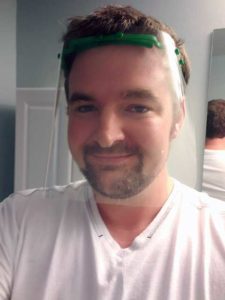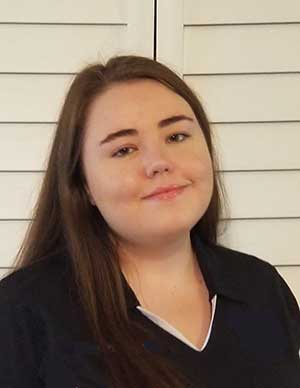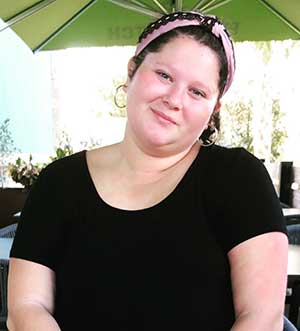The 3 million-plus volunteer hours students have documented since FGCU opened its doors in 1997 have continued to tick up over the months since COVID-19 started to spread and individuals isolated themselves in order to try to curb the contagion’s casualties.
After all, it’s human nature and Eagle inclination to want to reach out and help others — even if the gratification of giving has to be achieved at a safe distance. No question, everyone looks forward to the day when they can resume hands-on, face-to-face interaction, but remote service-learning is still service-learning.
Even as the Office of Service Learning & Civic Engagement began promoting opportunities for students to engage in virtual volunteering in March, eager Eagles were rising to the challenge of change. Some found ways to wield skills learned through their field of study to address the urgent needs of the healthcare community for personal protection equipment; others harnessed technology to help empower nonprofit organizations to continue outreach and educational programs that benefit children, pets and wildlife.

Scott Presbrey, who’s pursuing an FGCU bioengineering degree so he can design and manufacture medical devices that improve people’s lives, had service-learning in mind when he repurposed his personal 3D printers to fabricate and donate hundreds of facial shields for healthcare workers. “I have family who work on the front lines, and I know they are in desperate need,” he told FGCU360 in April.
Students in a “Foundations of Civic Engagement” course who had planned in-person trainings to help citizens recognize signs of human trafficking pivoted to host their session online — with the added upside of potentially reaching more people because they could click in from anywhere rather than being physically present. Another class that had been serving by socializing cats and dogs at the Animal Refuge Center revamped its project to include the creation of informational presentations for the organization’s Junior Ambassador Program, which educates children in the community about properly caring for cats and dogs; the group also launched an online fundraiser for the organization.
The Office of Service Learning & Civic Engagement invites students to spotlight virtual volunteering on its Instagram to help inspire peers to think outside the box of traditional, in-person service. Posts have highlighted efforts such Zoom writing workshops for adults with autism spectrum disorder, and handmade cards of encouragement sent to hospitalized children and seniors.
“Pandemic or not, service-learning continues to be a vital part of The FGCU Effect,” insisted Justin Fitzgerald, director of community engagement. “Service-learning has always been a key piece of the FGCU experience. We’re fortunate that, despite the pandemic, today’s technology allows our students to continue virtually engaging in meaningful experiences that increase their development while also serving our community partners.
“Whether through individual pursuit or course-based assignments, students are continuing to serve in unique and inspiring ways.”
An educational experience designed to match academic goals and personal interests while meeting community and university needs, FGCU’s service-learning program also helps students enhance communication skills, critical thinking and social awareness. All of which can only help them cope with the new challenges of our changing world.

Megan Wagner rose to the new challenges in a way that benefits the university as well as local schools. Before graduating in spring with a community health degree and entering a fast-track occupational therapy doctoral program at Nova Southeastern University, she developed a lesson plan about Florida ecosystems based around a tour of FGCU’s Food Forest. Aimed at kindergarten through second grade, as well as special education classes, the plan includes reading “The Lorax,” the Dr. Seuss book that chronicles the plight of the environment, and engaging in activities that teach about plant life, composting and sustainability.
“A lot of the classes I took for my degree involved health education and community education, so I already had a background in how to do a lesson plan and implement it,” Wagner said. “Also, my mom’s a teacher so I know a lot about lesson plans and field trips and making sure they’re inclusive. It’s also important to have a field journal component, so teachers can assess how well students learned.”
Her biggest hurdle? She had never visited the Food Forest. A tour had been planned as part of her spring “University Colloquium” coursework, but it was canceled when COVID-19 pandemic forced the university to continue classes remotely.
“It was a challenge,” Wagner said. “I had to do a lot of independent research on how the Food Forest is set up. Once I got in touch with (Food Forest advisor and service-learning coordinator) Jessi Drummond, she gave me a lot of information.”

Education was also the route Madeline Miller took to continue service-learning remotely. The junior integrated studies major answered a call for help with producing a series of educational videos from Boys and Girls Club of Collier County, which sought to keep its members engaged and learning life skills even while they couldn’t attend programs in person.
“The club was not able to set up the platform on their own,” Miller said. “Even after everything opens up again, the programs we developed can still be used.”
When that day comes, she hopes to be able to continue serving in person with the Boys and Girls Club. Part of the gratification of volunteering is witnessing the impact it has on community partners and individuals.
“We’re not seeing the effect now, because of the situation, but we know someone somewhere is being helped,” Miller said. “We need to continue doing this work and see where the need is.”
Wagner echoed that sentiment, suggesting that students looking to serve remotely reach out to organizations they’ve worked with before to see how they can help. In times of widespread need, it’s more critical than ever for Eagles to continue upholding FGCU’s commitment to serving the community.
“For me it’s important because it’s a way to give back in a meaningful way with the skills and knowledge I have,” she said. “It might seem hard to do remotely, but there’s still stuff that has to be done even though we have to isolate.”[/vc_column_text][vc_column_text]
WEBINAR SEPT. 3
How does FGCU continue to engage students during a pandemic? Dr. Christopher Blakely, interim assistant vice president/dean of students, and Dr. Brian Fisher, associate vice president for student engagement, will address this question and look ahead to life on campus this fall in an “Inside Access” webinar presented by University Advancement from 2-3 p.m. Thursday, Sept. 3. Register to participate online.
VIRTUAL SERVICE-LEARNING TIPS
The Office of Service-Learning & Civic Engagement’s website as well as EagleLink offer information about virtual service projects in addition to in-person opportunities with safety precautions. With 350 community partners to choose from, opportunities to earn hours abound. Some suggested activities:
- Conducting background research or gathering best practices or other information requested by the agency
- Recording or streaming performances or workshops that benefit the organization
- Creating digital and other social media content, print materials or other methods for information-sharing.
- Undertaking assessment, evaluation or feedback via phone or web-based services